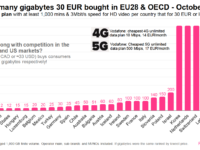The cost of wireless services emerged as a political issue during the recent national election, with most parties taking turns promising measures to increase competitiveness and lower consumer costs. The Liberals based their platform on a commitment to reduce costs by 25 per cent over the next two years, a measure that some analysts suggested had already been met. I argued that the 25 per cent reduction target was measuring the wrong thing, noting that “the 25 per cent price decline may sound attractive, but if other countries experience declines of 30 per cent or 40 per cent, it means that Canadians would actually be paying even more relative to consumers elsewhere.”
Archive for October 30th, 2019

Law Bytes
Episode 257: Lisa Given on What Canada Can Learn From Australia’s Youth Social Media Ban
byMichael Geist

February 9, 2026
Michael Geist
Episode 256: Jennifer Quaid on Taking On Big Tech With the Competition Act's Private Right of Access
February 2, 2026
Michael Geist
The Law Bytes Podcast, Episode 255: Grappling with Grok – Heidi Tworek on the Limits of Canadian Law
January 26, 2026
Michael Geist
December 22, 2025
Michael Geist
December 8, 2025
Michael Geist
Search Results placeholder
Recent Posts
 The Law Bytes Podcast, Episode 257: Lisa Given on What Canada Can Learn From Australia’s Youth Social Media Ban
The Law Bytes Podcast, Episode 257: Lisa Given on What Canada Can Learn From Australia’s Youth Social Media Ban  Court Ordered Social Media Site Blocking Coming to Canada?: Trojan Horse Online Harms Bill Clears Senate Committee Review
Court Ordered Social Media Site Blocking Coming to Canada?: Trojan Horse Online Harms Bill Clears Senate Committee Review  An Illusion of Consensus: What the Government Isn’t Saying About the Results of its AI Consultation
An Illusion of Consensus: What the Government Isn’t Saying About the Results of its AI Consultation  The Law Bytes Podcast, Episode 256: Jennifer Quaid on Taking On Big Tech With the Competition Act’s Private Right of Access
The Law Bytes Podcast, Episode 256: Jennifer Quaid on Taking On Big Tech With the Competition Act’s Private Right of Access  Government Says There Are No Plans for National Digital ID To Access Services
Government Says There Are No Plans for National Digital ID To Access Services

